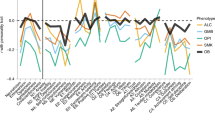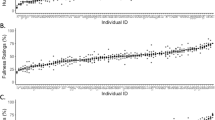Abstract
Background/objectives
Previous studies have shown that the temperament traits are related to risk factors for chronic diseases, which could be partly explained by lifestyle habits. However, little is known whether temperament traits associate with diet. The aim of this study was to examine the cross-sectional associations between temperament traits and the whole diet.
Subjects/methods
We studied 1668 men and women, aged 56−70, from the Helsinki Birth Cohort Study. Temperament was measured using the Tridimensional Personality Questionnaire. Information on diet was collected by a validated 128-item food frequency questionnaire. The associations of temperament traits; novelty seeking (NS), harm avoidance (HA), reward dependence (RD), and persistence (P), with diet were tested by linear regression analysis.
Results
After adjustment for potential confounders, greater HA was related to poorer diet quality, including lower consumption of vegetables, fruits, fish and several vitamins. RD was associated with healthier diet quality, including higher consumption of vegetables and intake of vitamin E and lower intake of alcohol. NS was significantly related to higher intake of fish, fat and alcohol and lower consumption of cereals, milk products and carbohydrates. No significant associations between P and intake of foods and nutrients were observed.
Conclusions
Our results suggest that there is an association between temperament traits and diet. Especially greater HA seems to associate with poorer diet quality and greater RD with healthier diet quality.
This is a preview of subscription content, access via your institution
Access options
Subscribe to this journal
Receive 12 print issues and online access
$259.00 per year
only $21.58 per issue
Buy this article
- Purchase on Springer Link
- Instant access to full article PDF
Prices may be subject to local taxes which are calculated during checkout
Similar content being viewed by others
References
Thomas A, Chess S. Temperament and personality. In: Kohnstamm GA, Bates JE, Rothbart MK, editors. Temperament in childhood. New York: Wiley; 1989. p. 249–69.
Caspi A, Harrington H, Milne B, Amell JW, Theodore RF, Moffitt TE. Children’s behavioral styles at age 3 are linked to their adult personality traits at age 26. J Pers. 2003;71:495–513.
Cloninger CR. A systematic method for clinical description and classification of personality variants. A proposal. Arch Gen Psychiatry. 1987;44:573–88.
Cloninger CR, Svrakic DM, Przybeck TR. A psychobiological model of temperament and character. Arch Gen Psychiatry. 1993;50:975–90.
Keltikangas-Järvinen L, Ravaja N, Viikari J. Identifying Cloninger’s temperament profiles as related to the early development of the metabolic cardiovascular syndrome in young men. Arterioscler Thromb Vasc Biol. 1999;19:1998–2006.
Hintsanen M, Pulkki-Råback L, Juonala M, Viikari JS, Raitakari OT, Keltikangas-Järvinen L. Cloninger’s temperament traits and preclinical atherosclerosis: the Cardiovascular Risk in Young Finns Study. J Psychosom Res. 2009;67:77–84.
Rosenström T, Jokela M, Cloninger CR, Hintsanen M, Juonala M, Raitakari O, et al. Associations between dimensional personality measures and preclinical atherosclerosis: the cardiovascular risk in Young Finns study. J Psychosom Res. 2012;72:336–43.
Sovio U, King V, Miettunen J, Ek E, Laitinen J, Joukamaa M, et al. Cloninger’s temperament dimensions, socio-economic and lifestyle factors and metabolic syndrome markers at age 31 years in the Northern Finland Birth Cohort 1966. J Health Psychol. 2007;12:371–82.
Etter JF, Pélissolo A, Pomerleau C, De Saint-Hilaire Z. Associations between smoking and heritable temperament traits. Nicotine Tob Res. 2003;5:401–9.
Puttonen S, Elovainio M, Kivimäki M, Koskinen T, Pulkki-Råback L, Viikari JS, et al. Temperament, health-related behaviors, and autonomic cardiac regulation: the cardiovascular risk in young Finns study. Biol Psychol. 2008;78:204–10.
Jurado D, Burgos-Garrido E, Diaz FJ, Martinez-Ortega JM, Gurpegui M. Adherence to the Mediterranean dietary pattern and personality in patients attending a primary health center. J Acad Nutr Diet. 2012;112:887–91.
van den Bree MB, Przybeck TR, Cloninger CR. Diet and personality: associations in a population-based sample. Appetite. 2006;46:177–88.
Barker DJ, Osmond C, Forsén TJ, Kajantie E, Eriksson JG. Trajectories of growth among children who have coronary events as adults. N Engl J Med. 2005;353:1802–9.
Ylihärsilä H, Kajantie E, Osmond C, Forsén T, Barker DJ, Eriksson JG. Body mass index during childhood and adult body composition in men and women aged 56–70 y. Am J Clin Nutr. 2008;87:1769–75.
Meltzer HM, Brantsaeter AL, Ydersbond TA, Alexander J, Haugen M. Methodological challenges when monitoring the diet of pregnant women in a large study: experiences from the Norwegian Mother and Child Cohort Study (MoBa). Matern Child Nutr. 2008;4:14–27.
Männistö S, Virtanen M, Mikkonen T, Pietinen P. Reproducibility and validity of a food frequency questionnaire in a case-control study on breast cancer. J Clin Epidemiol. 1996;49:401–9.
Paalanen L, Männistö S, Virtanen MJ, Knekt P, Räsänen L, Montonen J, et al. Validity of a food frequency questionnaire varied by age and body mass index. J Clin Epidemiol. 2006;59:994–1001.
Cloninger CR, Przybeck TR, Svrakic DM. The Tridimensional Personality Questionnaire: U.S. normative data. Psychol Rep. 1991;69:1047–57.
Willett W, Stampfer MJ. Total energy intake: implications for epidemiologic analyses. Am J Epidemiol. 1986;124:17–27.
McCrae RR,Costa PT,Jr . Personality trait structure as a human universal. Am Psychol. 1997;52:509–16.
De Fruyt F, Van De Wiele L, Van Heeringen C. Cloninger’s psychobiological model of temperament and character and the five-factor model of personality. Pers Individ Dif. 2000;29:441–52.
Mõttus R, McNeill G, Jia X, Craig LCA, Starr JM, Deary IJ. The associations between personality, diet and body mass index in older people. Health Psychol. 2013;32:353–60.
Mõttus R, Realo A, Allik J, Deary IJ, Esko T, Metspalu A. Personality traits and eating habits in a large sample of Estonians. Health Psychol. 2012;31:806–14.
Tiainen AM, Männistö S, Lahti M, Blomstedt PA, Lahti J, Perälä MM, et al. Personality and dietary intake—findings in the Helsinki birth cohort study. PLoS ONE. 2013;8:e68284.
Miettunen J, Kantojarvi L, Ekelund J, Veijola J, Karvonen JT, Peltonen L, et al. A large population cohort provides normative data for investigation of temperament. Acta Psychiatr Scand. 2004;110:150–7.
McNaughton SA, Mishra GD, Stephen AM, Wadsworth ME. Dietary patterns throughout adult life are associated with body mass index, waist circumference, blood pressure, and red cell folate. J Nutr. 2007;137:99–105.
Mishra GD, McNaughton SA, Bramwell GD, Wadsworth ME. Longitudinal changes in dietary patterns during adult life. Br J Nutr. 2006;96:735–44.
Acknowledgements
This study was funded by The Signe o. Ane Gyllenberg Foundation, The Juho Vainio Foundation, The Yrjö Jahnsson Foundation, The Academy of Finland, The Päivikki and Sakari Sohlberg Foundation, The Finnish Diabetes Research Foundation, The Finnish Foundation for Cardiovascular Research, Samfundet Folkhälsan, Liv och Hälsa and Finska Läkaresällskapet.
Author information
Authors and Affiliations
Corresponding author
Ethics declarations
Conflict of interest
The authors declare that they have no conflict of interest.
Rights and permissions
About this article
Cite this article
Perälä, MM., Tiainen, AM., Lahti, J. et al. Food and nutrient intakes by temperament traits: findings in the Helsinki Birth Cohort Study. Eur J Clin Nutr 72, 1136–1141 (2018). https://doi.org/10.1038/s41430-018-0229-4
Received:
Revised:
Accepted:
Published:
Issue Date:
DOI: https://doi.org/10.1038/s41430-018-0229-4



